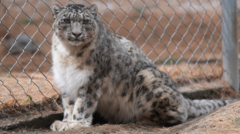The World Wide Fund for Nature is harnessing AI to protect vulnerable livestock while ensuring the survival of the elusive snow leopard species.
**AI Alerts: Potential Game-Changer for Snow Leopard Conservation**

**AI Alerts: Potential Game-Changer for Snow Leopard Conservation**
An innovative AI technology could hold the key to preserving endangered snow leopards in Pakistan.
In the vast, rugged terrains of Gilgit-Baltistan, Pakistan, conservationists are engaging in a groundbreaking initiative aimed at saving the endangered snow leopard. With a global population dwindling to an estimated 4,000 to 6,000, these majestic big cats face significant threats, primarily due to human-wildlife conflict. Each year, between 221 to 450 snow leopards are killed, many in retaliation for livestock losses—a situation exacerbated by the local farmers' fear of these predators.
Among the conservation efforts stands “Lovely,” a 12-year-old orphaned snow leopard who, due to her inability to hunt, has become a part of a larger conservation narrative. The World Wide Fund for Nature (WWF), in collaboration with Pakistan’s Lahore University of Management Sciences, is trialing artificial intelligence (AI) powered cameras that can detect the presence of snow leopards and alert nearby villagers through text messages.
These innovative cameras are solar-powered and equipped to function even in harsh winter conditions. They are strategically placed at high altitudes across various villages to track snow leopard movements and prevent livestock casualties. Asif Iqbal, a conservationist with WWF Pakistan, shared that the technology has shown promise, capable of distinguishing between wildlife and humans. However, local acceptance of this technology has been fraught with challenges.
Initial skepticism resulted in instances of vandalism against the devices, casting doubt on the community's willingness to embrace new conservation methods. Yet, as some locals have begun to understand the ecological importance of snow leopards, attitudes are shifting. Sitara, a local farmer, expressed her frustration over losing all her sheep to a snow leopard, indicating the deep economic effects these felines have on farmers' lives.
The conservation team has recognized that education and community involvement are vital in fostering trust and cooperation. There are ongoing discussions to broaden the project, including employing other deterrents like smells or sounds to keep snow leopards away from livestock areas.
Furthermore, despite government initiatives imposing legal penalties against poaching, the success of AI and community engagement remains uncertain. As WWF continues its efforts, the overarching hope is that this blend of technology and community outreach can create a lasting impact in safeguarding one of the world's most elusive and endangered carnivores. The fight to protect snow leopards, dubbed "the ghosts of the mountains," is an ongoing commitment that requires innovation and collaboration between conservationists and local communities alike.
Among the conservation efforts stands “Lovely,” a 12-year-old orphaned snow leopard who, due to her inability to hunt, has become a part of a larger conservation narrative. The World Wide Fund for Nature (WWF), in collaboration with Pakistan’s Lahore University of Management Sciences, is trialing artificial intelligence (AI) powered cameras that can detect the presence of snow leopards and alert nearby villagers through text messages.
These innovative cameras are solar-powered and equipped to function even in harsh winter conditions. They are strategically placed at high altitudes across various villages to track snow leopard movements and prevent livestock casualties. Asif Iqbal, a conservationist with WWF Pakistan, shared that the technology has shown promise, capable of distinguishing between wildlife and humans. However, local acceptance of this technology has been fraught with challenges.
Initial skepticism resulted in instances of vandalism against the devices, casting doubt on the community's willingness to embrace new conservation methods. Yet, as some locals have begun to understand the ecological importance of snow leopards, attitudes are shifting. Sitara, a local farmer, expressed her frustration over losing all her sheep to a snow leopard, indicating the deep economic effects these felines have on farmers' lives.
The conservation team has recognized that education and community involvement are vital in fostering trust and cooperation. There are ongoing discussions to broaden the project, including employing other deterrents like smells or sounds to keep snow leopards away from livestock areas.
Furthermore, despite government initiatives imposing legal penalties against poaching, the success of AI and community engagement remains uncertain. As WWF continues its efforts, the overarching hope is that this blend of technology and community outreach can create a lasting impact in safeguarding one of the world's most elusive and endangered carnivores. The fight to protect snow leopards, dubbed "the ghosts of the mountains," is an ongoing commitment that requires innovation and collaboration between conservationists and local communities alike.





















